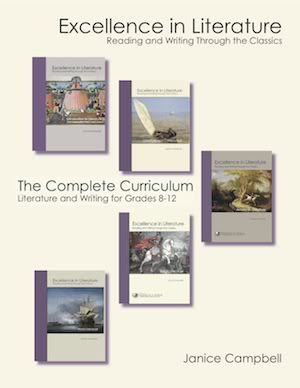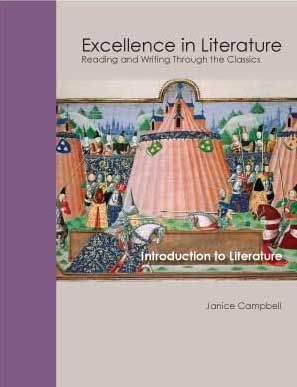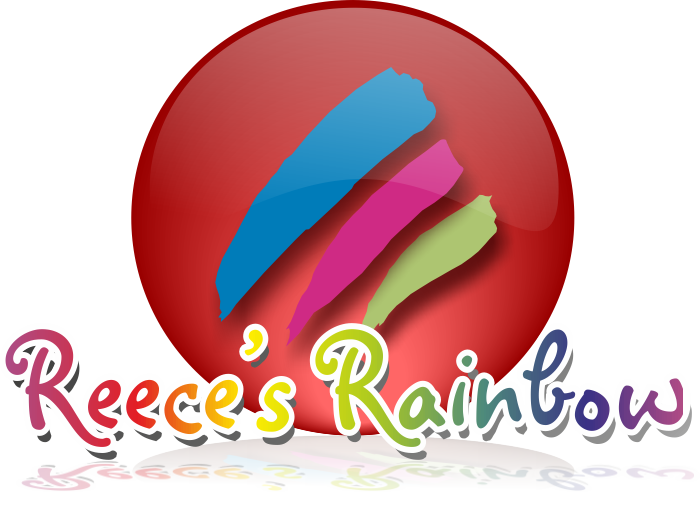
We specifically used the Introduction to Literature course, written by Janice Campbell.

In this course, he will work through different writing styles and books.
We have only worked on Unit One so far, which is Short Stories.
Unit Two: Around the World in Eighty Days, by Jules Verne
Unit Three: A Connecticut Yankee in King Arthur's Court, by Mark Twain.
For a complete list of what is covered in this Introduction to Literature Course, click here.
By the end of the course, students will:
- Understand the process of writing, including the use of tools such as a writer’s handbook, dictionary, and thesaurus.
- Have specific understanding of selected representative texts by major authors of the periods studied.
- Have a general understanding of the historical and cultural contexts of the works.
- Be able to analyze literary texts and present thoughtfully developed ideas in writing.
- Demonstrate competence in essay organization, style, and mechanics.
This course is designed to be student led, as the goal of any high school type curriculum should be, to prepare them for life when everything isn't being "spoon fed" to them. I love this idea! Ms. Campbell really stresses, in this book, that it is the student's responsibility to read through the book and complete the assignments, not the parents to get in there and tell them what needs to be done and how to do it. This approach ties in with the personal responsibility angle we try to use with our kids.
Ms. Campbell does make suggestions for how to organize their materials and time, so they aren't just thrown into the deep end, but, it is up to them to read it and follow her suggestions. She also clarifies that, by this point in their schooling (8th to 12th grade), they should have some basic grammar, spelling and language mechanics down pat, so it is expected that they will proof read, correct and edit their papers themselves, before handing it in!
It really is preparing them for college life when their professors are not going to be their mothers and fathers!
Ms. Campbell, even has a segment called How To Read A Book.
I know.
Sounds funny. But, I got so many good ideas that I loved from this section of the book (which is before the "real" book even starts) that there too many to list....but, I will give you a few:
- Listen to a bit of music that the author may have listened to (like from the same time period), which can help you gain an understanding into the artistic influences the author may have had;
- Read the book at a comfortable pace, fast enough to sustain interest, but slow enough to understand what is happening (sometimes my kids have a tendency to just whip through the book and not take the time to make sure they know what is happening....or know what the words mean that they are reading); which leads us to the next point.....
- As you read, keep an index card or piece of paper tucked into the back of the book. Write down any words you encounter that you don’t know, and look them up and write down the definition. If you understand the basic meaning from the context and you don’t want to interrupt the flow of the story, you may look up the word later.
Another idea, which I found strangely freeing - was that for more challenging books (her examples were: Chaucer's Canterbury Tales and Dantes Inferno), it is okay to read a children's version or even a Cliff's Notes version first. Yes, first....not instead. She explained that these types of books just help you understand the book better....just like a parent would do when first teaching something to their child.
From Ms. Campbell's introduction:
Reading without understanding is like walking onto a softball field and batting the ball, without any knowledge of what to do next. You may hit the ball out of the park, but if you don’t run the bases and complete the play, you’ve missed the whole point of the activity.
That baseball analogy itself won over D-man and Rainman at our house.
We are working through this course more slowly than intended, it is the first college prep course we have started at our house.....so the learning curve is a bit steep right now for us. There are examples of formats and models to be used for each type of paper written (approach, essay, summary) as well as a rubric for parents/teachers to use when evaluating how well your student has done.
I feel good about this course, partly because of the selections I have seen and partly because Ms. Campbell "successfully" homeschooled her four boys through high school and onto college.
I am confident that we will continue using this program and probably expand into the others offered by Everyday Education, like World Literature, British Literature and American Literature courses.
You can get a free sample unit by clicking here (then click on the Free Sample Link), but you can also purchase Introduction to Literature through Everyday Education for $29 for a book, but, if you are interested in the instant reward of an E-book, it is just $27.

Go take a look at what other members of the TOS crew thought of this product too.

That baseball analogy itself won over D-man and Rainman at our house.
We are working through this course more slowly than intended, it is the first college prep course we have started at our house.....so the learning curve is a bit steep right now for us. There are examples of formats and models to be used for each type of paper written (approach, essay, summary) as well as a rubric for parents/teachers to use when evaluating how well your student has done.
I feel good about this course, partly because of the selections I have seen and partly because Ms. Campbell "successfully" homeschooled her four boys through high school and onto college.
I am confident that we will continue using this program and probably expand into the others offered by Everyday Education, like World Literature, British Literature and American Literature courses.
You can get a free sample unit by clicking here (then click on the Free Sample Link), but you can also purchase Introduction to Literature through Everyday Education for $29 for a book, but, if you are interested in the instant reward of an E-book, it is just $27.

Go take a look at what other members of the TOS crew thought of this product too.

We received a free downloaded copy of the E-book Introduction to Literature in exchange for an honest review of the product.




















0 comments:
Post a Comment